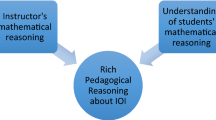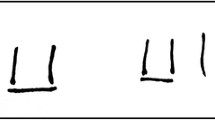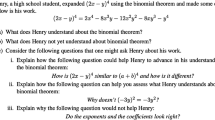Abstract
Building on the work of Ball and McDiarmid,this study provides an equivalent at thesecondary level to the work of Liping Ma at theelementary level in that it provides a betterunderstanding of the conceptual knowledge ofschool mathematics held by prospectivesecondary teachers, along with examples of thesorts of knowledge needed to teach forunderstanding within the domain of integersubtraction. Part of an eight-yearlongitudinal study of secondary teachercandidates' conceptions of instructionalexplanations, this analysis of interaction inthe author's methods course and its discussionof epistemological obstacles and changescombines subject-matter and interactionistperspectives. The author concludes thatsecondary teacher candidates can deepen theirrelational knowledge of secondary mathematicswithin a methods course by focusing oninstructional explanations.
Similar content being viewed by others
REFERENCES
Ball, D.L. (1988). The subject-matter preparation of prospective mathematics teachers: Challenging the myths. Issue paper 88-3. East Lansing, MI: National Center for Research on Teacher Education.
Ball, D.L. (1988). Unlearning to teach mathematics. Issue paper 88-1. East Lansing, MI: National Center for Research on Teacher Education.
Ball, D.L. (1990). Breaking with experience in learning to teach mathematics: The role of a pre-service methods course. For the Learning of Mathematics, 10(2), 10–16.
Ball, D.L. (1992). The mathematical understandings that prospective teachers bring to teacher education. In J. Brophy (Ed.), Advances in research on teaching (Volume 2, 1–48). Greenwich, CT: JAI.
Ball, D.L. & McDiarmid, G.W. (1990). The subject-matter preparation of teachers. In W. Robert Houston (Ed.), Handbook of research on teacher education: A project of the Association of Teacher Educators. New York: Macmillan.
Brown, H.I. (1977). Perception, theory and commitment: The new philosophy of science. Chicago: University of Chicago Press.
Dewey, J. (1916/1944). Democracy and education. New York: The Free Press.
Donald, J.G. (1991). Knowledge and the university curriculum. In C.F. Conrad & J.G. Haworth (Eds.), Curriculum in transition: Perspectives on the undergraduate experience (295–307). Needham Heights, MA: Ginn Publishing.
Glaser, B. & Strauss, A. (1967). The discovery of grounded theory. New York: Aldine.
Hershkowitz, R., Baruch, B.S. & Dreyfus, T. (2001). Abstraction in context: Epistemic actions. Journal for Research in Mathematics Education, 32(2), 195–222.
Hiebert, J. (1986). Conceptual and procedural knowledge: The case of mathematics.Hillsdale, NJ: Lawrence Erlbaum.
Kinach, B.M. (1996). Logical trick or mathematical explanation? Re-negotiating the epistemological stumbling blocks of pre-service teachers in the secondary mathematics methods course. Proceedings of the eighteenth Annual Meeting of the North American Chapter of the International Group for the Psychology of Mathematics Education, Volume 2 (414–420). Columbus, OH: Ohio State University.
Kinach, B.M. (2001). Assessing, challenging, and developing prospective teachers' pedagogical content knowledge and beliefs: A role for instructional explanations. In T. Ariav, A. Keinan & R. Zuzovsky (Eds.), The ongoing development of teacher education: Exchange of ideas. Tel Aviv, Israel: The Mofet Institute.
Kinach, B.M. (2002). A cognitive strategy for developing prospective teachers' pedagogical content knowledge in the secondary mathematics methods course: Toward a model of effective practice. Teaching and Teacher Education, 18(1), 51–71.
Ma, L. (1999). Knowing and teaching elementary mathematics: Teachers' understanding of fundamental mathematics in China and the United States. Mahwah, NJ: Lawrence Erlbaum Associates.
Martin, J.R. (1970). Explaining, understanding and teaching. New York: McGraw Hill.
McDiarmid, G.W. (1990). Challenging prospective teachers' beliefs during an early field experience: A quixotic undertaking? Journal of Teacher Education, 41(3), 12–20.
National Council of Teachers of Mathematics. (1989). Curriculum and evaluation standards for mathematics. Reston,VA: author.
National Council of Teachers of Mathematics. (2000). Principles and standards for school mathematics. Reston,VA: author.
Pape, S.J. & Tchoshanov, M.A. (2001). The role of representation(s) in developing mathematical understanding. Theory into Practice, 40(2), 118–127.
Perkins, D.N. (1992). Smart schools: Better thinking and learning for every child.New York: Free Press.
Perkins, D.N. & Simmons, R. (1988). Patterns of misunderstanding: An integrative model for science, math, and programming. Review of Educational Research, 58(3), 303–326.
Pimm, D. (1995). Symbols and meanings in school mathematics. New York: University of Oxford Press.
Schwab, J.J. (1978). Education and the structure of the disciplines. In I. Westbury & N.J. Wilkof (Eds.), Science, curriculum and liberal education: Selected essays (229–272). Chicago: University of Chicago Press.
Shulman, L.S. (1987). Knowledge and teaching: Foundations of the new reform. Harvard Educational Review, 57(1), 1–22.
Sierpinska, A. (1990). Some remarks on understanding in mathematics. For the Learning of Mathematics, 10(3), 24–41.
Skemp, R.R. (1976). Relational understanding and instrumental understanding. Mathematics Teaching, 77, 20–26a.
Skemp, R.R. (1978). Relational understanding and instrumental understanding. Arithmetic Teacher, 26(3), 9–15.
Stodolsky, S.S. (1985). Telling math: Origins of math aversion and anxiety. Educational Psychologist, 20(3), 125–133.
Steinbring, H. (1998). Elements of epistemological knowledge for mathematics teachers. Journal of Mathematics Teacher Education, 1, 157–189.
Tall, D. (1978). The dynamics of understanding mathematics. Mathematics Teaching, 84, 50–52.
Thompson, A.G. (1984). The relationship of teachers' conceptions of mathematics teaching to instructional practice. Educational Studies in Mathematics, 15, 105–127.
Thompson, A.G. (1992). Teachers' beliefs and conceptions: A synthesis of the research. InDouglas A. Grouws (Ed.), Handbook of research on mathematics teaching and learning (127–146). New York: Macmillan.
Watanabe, T. & Kinach, B. (1997). Creating a community of inquiry in an undergraduate mathematics course for prospective middle grade teachers: Voices from MCTP. Paper presented at the American Educational Research Association, Chicago.
Winicki-Landman, G. & Leikin, R. (2000). On equivalent and non-equivalent definitions: Part 1. For the Learning of Mathematics, 20(1), 17–21.
Wiske, M.S. (Ed.) (1998). Teaching for understanding: Linking research with practice. San Francisco, CA: Jossey-Bass.
Author information
Authors and Affiliations
Rights and permissions
About this article
Cite this article
Kinach, B.M. Understanding and Learning-to-explain by Representing Mathematics: Epistemological Dilemmas Facing Teacher Educators in the Secondary Mathematics ``Methods'' Course. Journal of Mathematics Teacher Education 5, 153–186 (2002). https://doi.org/10.1023/A:1015822104536
Issue Date:
DOI: https://doi.org/10.1023/A:1015822104536




